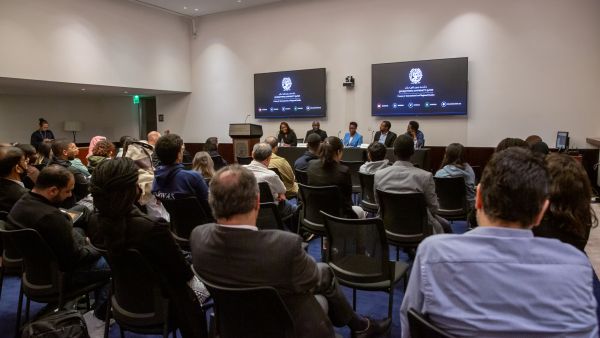Georgetown University in Qatar Hosts Groundbreaking Event on African Regionalism at QF

An ambitious project which aims to produce the first comprehensive compilation of African regional organizations (AROs) in the 21st century was launched at a recent panel discussion at QF partner, Georgetown University in Qatar (GU-Q). Scholars from around the world convened to discuss “African Regionalism: Achievements, Challenges, and Prospects” as part of a larger Center for Regional and International Studies (CIRS) research project on the “Evolution of African Regional Organizations”
Project lead Dr. Lynda Chinenye Iroulo, Assistant Professor at GU-Q, noted that while interest in how African countries cooperate is growing, there is limited literature that provides students with a historical evolution of regionalism, including the African Union and all Regional Economic Communities in the 21st century.
“This is what this project is doing: going back to revisit the ideological and intellectual origins of these regional organizations, and putting them together as a handbook that would be relevant for anyone interested in AROs, especially senior undergraduate and graduate students, governing bodies, researchers, and multinational organizations,” she said.
The program’s participating scholars represent universities in Cameroon, South Africa, Ghana, the US, Morocco, Tanzania, the Netherlands, Germany, and Qatar and the Gulf region. Their experience includes years of studying, researching, consulting, and even working for AROs in the study. The panel discussion covered the topics of national sovereignty, self-determination, decolonization, and in-continent investment in AROs.
Dalva Raposo, a junior majoring in International Politics, brought the perspective of youth to the table, highlighting that 60% of the African population is made up of people under the age of 25. "This makes youth the continent's greatest asset for the growth and development agenda," she said.
The panel was held alongside a research workshop where project members convened to discuss written contributions for the forthcoming edited volume on the topic. Building on previous work done by CIRS, this project will not only provide a comprehensive study of African IOs but will also expand on present theoretical analyses in the field. It will examine the role of the youth in African regionalism, the evolution of the Afro-Arab region, relations with other external organizations, and the relationship between these regional organizations will also be explored and addressed.
Background Information
Georgetown University in Qatar
Established in 1789 in Washington, DC, Georgetown University is one of the world’s leading academic and research institutions. Georgetown University in Qatar (GU-Q), founded in 2005 in partnership with Qatar Foundation, seeks to build upon the world-class reputation of the university through education, research, and service. Inspired by the university’s mission of promoting intellectual, ethical, and spiritual understanding, GU-Q aims to advance knowledge and provide students and the community with a holistic educational experience that produces global citizens committed to the service of humankind.
Located in Doha’s Education City, GU-Q offers the same internationally recognized Bachelor of Science in Foreign Service degree as Georgetown’s Capitol Campus in Washington, DC. This unique, interdisciplinary program prepares students to tackle the most important and pressing global issues by helping them develop critical thinking, analytic, and communication skills within an international context. GU-Q alumni work in leading local and international organizations across industries ranging from finance to energy, education, and media. The Qatar campus also serves as a residency and delivery location for the Executive Master’s in Emergency and Disaster Management along with the Executive Master’s in Leadership.







